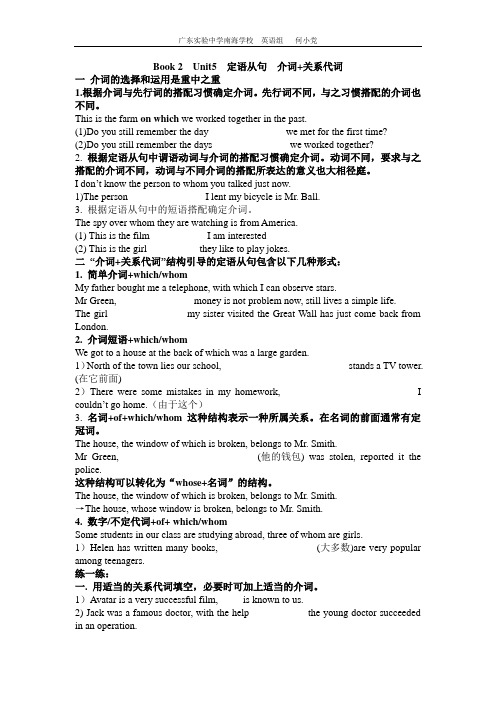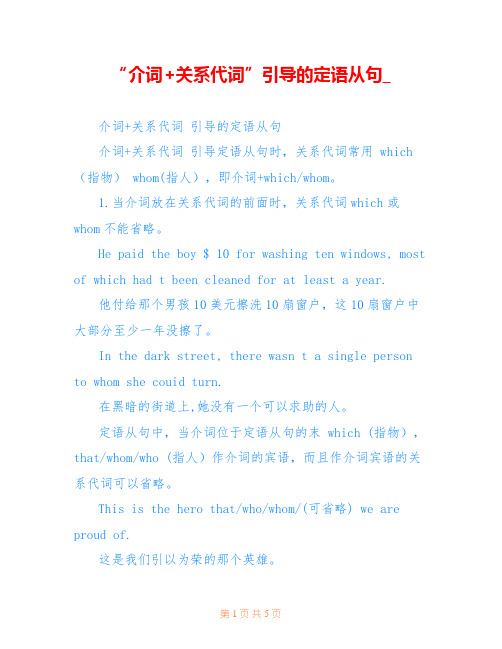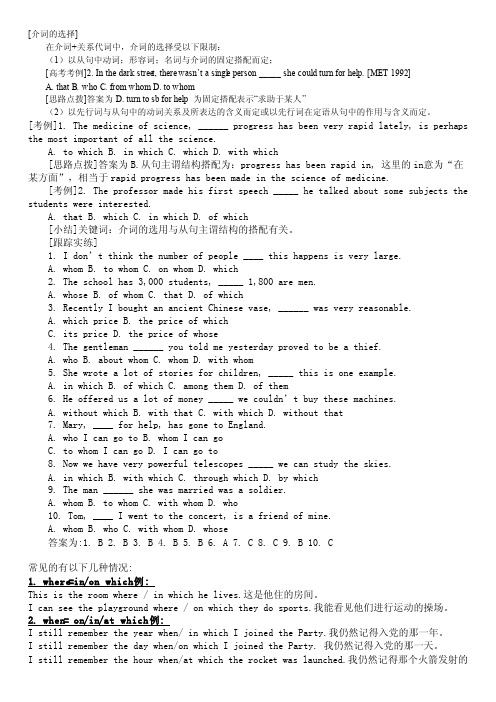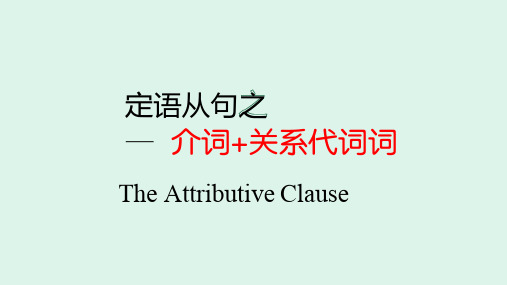定语从句和介词
定语从句 介词+关系代词

Book 2 Unit5 定语从句介词+关系代词一介词的选择和运用是重中之重1.根据介词与先行词的搭配习惯确定介词。
先行词不同,与之习惯搭配的介词也不同。
This is the farm on which we worked together in the past.(1)Do you still remember the day _____ _________ we met for the first time?(2)Do you still remember the days _____ _________ we worked together?2. 根据定语从句中谓语动词与介词的搭配习惯确定介词。
动词不同,要求与之搭配的介词不同,动词与不同介词的搭配所表达的意义也大相径庭。
I don’t know the person to whom you talked just now.1)The person _____ _________ I lent my bicycle is Mr. Ball.3. 根据定语从句中的短语搭配确定介词。
The spy over whom they are watching is from America.(1) This is the film ____ ______ I am interested(2) This is the girl ___ ______ they like to play jokes.二“介词+关系代词”结构引导的定语从句包含以下几种形式:1. 简单介词+which/whomMy father bought me a telephone, with which I can observe stars.Mr Green, _____ _________ money is not problem now, still lives a simple life.The girl _____ _________ my sister visited the Great Wall has just come back from London.2. 介词短语+which/whomWe got to a house at the back of which was a large garden.1)North of the town lies our school, _____ _____ _____ ________ stands a TV tower. (在它前面)2)There were some mistakes in my homework, __________ _______ _______ I couldn’t go home.(由于这个)3. 名词+of+which/whom 这种结构表示一种所属关系。
“介词+关系代词”引导的定语从句_

“介词+关系代词”引导的定语从句_介词+关系代词引导的定语从句介词+关系代词引导定语从句时,关系代词常用 which (指物) whom(指人),即介词+which/whom。
1.当介词放在关系代词的前面时,关系代词which或whom不能省略。
He paid the boy $ 10 for washing ten windows, most of which had t been cleaned for at least a year.他付给那个男孩10美元擦洗10扇窗户,这10扇窗户中大部分至少一年没擦了。
In the dark street, there wasn t a single person to whom she couid turn.在黑暗的街道上,她没有一个可以求助的人。
定语从句中,当介词位于定语从句的末 which (指物),that/whom/who (指人)作介词的宾语,而且作介词宾语的关系代词可以省略。
This is the hero that/who/whom/(可省略) we are proud of.这是我们引以为荣的那个英雄。
This is the pen that/which/(可省略) I I wrote the letter with.这是我写信时用的那支钢笔。
【温馨提示】①有些动词+介词的固定词组不可把介词置于关系代词前。
这就是我正在找的磁带。
[误]This is the right tape for which I m looking, [正]This is the right tape that I m looking for.②常见的不可拆开的动词词组有:care for 喜欢,关心deal with 处理,对付get through 通过;到达;接通电话hear from/of 收到某人的来信/听说look for/after寻找/照顾send for派人去请see to照管,料理3.复合介词短语+关系代词which 引导的定语从句,这种结构引导的定语从句常与先行词用逗号分开,定语从句常用倒装语序。
定语从句用法的总结

定语从句用法的总结定语从句用法的总结定语从句在句中相当于一个形容词,下面定语从句用法的总结是小编想跟大家分享的,欢迎大家浏览。
一.定语从句及相关术语1.定语从句:修饰某一句中的.名词或代词的从句称为定语从句,一般紧跟在它所修饰的先行词后面。
被修饰的词称为先行词。
2.关系词:引导定语从句的关联词称为关系词关系词有关系代词和关系副词。
关系代词有that, which, who, whom, whose, as等;关系副词有where, when, why等。
关系词常有3个作用:1,引导定语从句。
2,代替先行词。
3,在定语从句中担当一个成分。
二.关系代词引导的定语从句1.who指人,在从句中做主语(1)The boys who are playing football are from Class One.(2)Yesterday I helped an old man who lost his way.2. whom指人,在定语从句中充当宾语,常可省略。
(1) Mr. Liu is the person (whom) you talked about on the bus.(2) Mr. Ling is just the boy whom I want to see.注意:关系代词whom在口语和非正式语体中常用who代替,可省略。
(3) The man who/whom you met just now is my friend.3. which指物,在定语从句中做主语或者宾语,做宾语时可省略(1) Football is a game which is liked by most boys.(2) This is the pen (which) he bought yesterday.4. that指人时,相当于who或者whom;指物时,相当于which。
在宾语从句中做主语或者宾语,做宾语时可省略。
定语从句介词用法

[介词的选择]在介词+关系代词中,介词的选择受以下限制:(1)以从句中动词;形容词;名词与介词的固定搭配而定;[高考考例]2. In the dark street, therewasn’tasingle person _____she couldturn for help. [MET 1992]A. thatB. whoC. from whomD. to whom[思路点拨]答案为D. turn to sb for help 为固定搭配表示“求助于某人”(2)以先行词与从句中的动词关系及所表达的含义而定或以先行词在定语从句中的作用与含义而定。
[考例]1. The medici ne of scienc e, ______ progre ss has been very rapidlately, is perhap s the most import ant of all the scienc e.A. to whichB. in whichC. whichD. with which[思路点拨]答案为B.从句主谓结构搭配为:progre ss has been rapidin, 这里的in意为“在某方面”,相当于rap id progre ss has been made in the scienc e of medici ne.[考例]2. The profes sor made his firstspeech _____he talked aboutsome subjec ts the studen ts were intere sted.A. thatB. whichC. in whichD. of which[小结]关键词:介词的选用与从句主谓结构的搭配有关。
[跟踪实练]1. I don’t thinkthe number of people ____ this happen s is very large.A. whomB. to whomC. on whomD. which2. The school has 3,000 studen ts, _____1,800 are men.A. whoseB. of whomC. thatD. of which3. Recent ly I bought an ancien t Chines e vase, ______ was very reason able.A. whichpriceB. the priceof whichC. its priceD. the priceof whose4. The gentle man ______ you told me yester day proved to be a thief.A. whoB. aboutwhomC. whomD. with whom5. She wrotea lot of storie s for childr en, _____this is one exampl e.A. in whichB. of whichC. amongthemD. of them6. He offere d us a lot of money_____we couldn’t buy thesemachin es.A. withou t whichB. with thatC. with whichD. withou t that7. Mary, ____ for help, has gone to Englan d.A. who I can go toB. whom I can goC. to whom I can goD. I can go to8. Now we have very powerf ul telesc opes_____we can studythe skies.A. in whichB. with whichC. throug h whichD. by which9. The man ______ she was marrie d was a soldie r.A. whomB. to whomC. with whomD. who10. Tom, ____ I went to the concer t, is a friend of mine.A. whomB. whoC. with whomD. whose答案为:1. B 2. B 3. B 4. B 5. B 6. A 7. C 8. C 9. B 10. C常见的有以下几种情况:1. where=in/on which例:This is the room where/ in whichhe lives.这是他住的房间。
介词关系代词引导的定语从句

定语从句之—介词+关系代词词The Attributive Clause关系代词的用法;在复合句中修饰一个名词或代词的从句称为定语从句,一般紧跟在它所修饰的名词或代词后面。
定语从句所修饰的名词或代词称为先行词。
引导定语从句的关联词称为关系词,关系词有关系代词和关系副词。
关系代词有that ,which ,who ,whom ,whose 。
考查重点定语从句定语从句是中考必考考点之一,主要考查的是时态及宾语从句的语序,有时也会考查定语从句的引导词。
考查的主要形式是单项填空、完形填空、短文填空和完成句子。
阅读理解和书面表达肯定也会考查到定语从句。
因此学生要熟练掌握定语从句的用法。
关系代词引导的定语从句最为常见和常考。
命题趋势引导定语从句的关系词有关系代词和关系副词,关系代词和关系副词放在先行词及定语从句之间起连接作用,同时又作定语从句的重要成分。
常见的关系代词包括that, which, who(宾格whom,所有格whose)等关系副词包括where, when, why等根据定语从句与先行词的关系,定语从句可分为限制性定语从句及非限制性定语从句。
限制性定语从句:紧跟先行词,主句与从句不用逗号分开,从句不可省去。
非限制性定语从句:主句与从句之间有逗号分开,起补充说明作用,如省去,意思仍完整。
关系代词:who、that、whom、whose、which 做作主主语做宾语语1)指人:who/that 指物:which/that 2)指人:who/whom/that/省略指物:which/that/省略► The man who/tha t spoke at the ► The building which/that is ► I visited a scientist whose name is known all over themeeting is from Hong Kong.会上发言的人来自香港。
定语从句介词+which_介词+whom上课用

we worked together in the school.
❖2.The house to which he took us was very old. (which不能改为 that ,which不能省略)
On which
❖ 5. The topic ___(w__h_ic_h_/_th__a_t) Eric is interested in is Physics.
I agree with the idea ___th_a_t\_w_h_ic_h_\省__略__ you approve of 做of 的宾语
请还原which 在从句中的位置
❖ 5. This is the hero of whom we are proud.
❖ 6. There are three things _a_b_o_u_t _w_h_ich she is not sure.
1) The German boss____fo_r_w_h__o_m___ the actress works is a kind person.
下面两句中的介词能提前吗?
Is this the watch that you are looking for? The old man whom I am looking after is better .
在固定短语中介词不能提前
固定搭配的动词短语中的介词一般不能提前. 常见的这类动词短语有: look for/after/forward to, care for(照顾,喜欢) hear of/about/from, take care of等. This is the right place I’m looking for. The girl whom he is looking after is his
定语从句介词 which-介词 whom
在介词+which/ whom 引导定语的从句 中,我们需要注意以下几点
1,在非正式的英语表达中,介词常常在定语 从句的句尾。page.28.2
2,当介词处于定于从句的句尾时 “whom”“ which” 可以用“that” 代替 “whom” 可以用“who”替代。Page.28.3
5.In the dark street, there wasn’t a single person _fr_o_m_ _w_h_o_m_ she could ask for help.
More examples
Have you met the person _a_b_o_u_t _w_h_o_m_ he was speaking? He is the man __to__w_h_o_m__ you can turn for help.
3.This is the house __i_n_ w__h_ic_h___ I lived two years ago.
4.In the dark street, there wasn’t a single person __t_o_w_h__o_m_ she could turn for help.
当关系代词充当定于从句中某一介词的宾语时,通常把介词 提前,用“介词+关系代词”来引导定语从句。
I agree with the idea of which you approve .
注意:当介词前置时,只能用 whom 指人,which 指物
• 介词+which(指物)而不用 that
介词+whom (指人)而不用 who
together in the countryside.
介词加关系代词定语从句
为以下情Байду номын сангаас时,只用who,不用that
a. 当先行詞是those / she / he / they 等代詞时, 关系代詞用who.
Those who were late for class raise your hands. He who doesn’t go to the Great Wall is not a true man.
houses that I used to be familiar with were
gone.
关系代词引导的定语从句
Which of the books that were borrowed from the library is yours? There is a seat in the corner that is still free. f. 在以which开头的的特殊疑问句时, 为避免重复,用that. g. 主句以there be 开头,先行词指物.
关系代词引导的定语从句
The attributive clause or not? 1、从句是否紧跟在 一名词或代词之后。 2、关系词是否代先 行词,在从句中担任 一定的成分。
Criteria
关系代词引导的定语从句
The girl is Mary. / She is standing there. The girl (who is standing there ) is Mary. antecedent Relative pronoun
先行词所指 关系词在从句中的作用 人/物 物 人 人 人/物 人/物/事情 时间 地点 原因 主、宾、表 主、宾、表、定(偶) 主、宾 宾 定 主、宾、表 时间状语 地点状语 原因状语
定语从句中介词+关系词的用法
介词+关系代词”引导定语从句是我们学习定语从句的重点,也是高考的常考点。
学习这种从句应注意以下几点:1. 用于这种情况的关系代词一般为which(指物)和whom(指人)。
在这种结构中,介词的选择非常关键,可以遵循以下四个原则:(1)根据定语从句中的谓语动词确定介词,其动词与介词搭配,构成动词短语。
例如:Is this the car for which you paid a high price? (pay for)这是你花大价钱买的车吗?I n the dark street, there wasn’t a single person to whom she could turn for help. (turn to sb. for help)在黑暗的街上,她找不到一个人来帮助她。
The man with whom you shook hands just now is our English teacher. (shake hands with sb. )刚才你和他握手的那个人是我们的英语老师。
(2)根据定语从句中的形容词确定介词,其形容词与介词搭配,构成形容词短语。
例如:The two things about which Karl Marx was not sure were the grammar and some of the idioms. (be sure about)马克思没有把握的两件事是:语法和习惯用法。
The teacher with whom the students in our class are popular is Mr Wang, our English teacher. (be popular with)在我们班,深受学生欢迎的是王老师--我们的英语老师。
(3)根据定语从句修饰的先行词确定介词,其先行词往往是表示时间、地点、原因、方法、工具等的词,它们与介词之间有一定的联系。
定语从句介词+which_介词+whom
for which she
paid $10?
3. Do you like the book from which she
learned a lot?
4. Do you like the book about which she
often talks? 5. He built a telescope through which he
This school which /t×hat/×/ he once studiediinn
is very famous.
Tommorrow I’ll bring here the magazine. You asked _f_o_r_the magazine.
Tommorrow I’ll bring here the magazinewhich
❖ 8. I don’t like the way __(t_h_at_/i_n_w_h_ic_h_) _ you talk to your mother.
9. The song is _t_h_e_o_n_e__(_th_a_t_/w__h_ic_h_)I like best. 10. Do you like the song _(_th_a_t_/w_h_i_ch_)_ we listened to before class?
❖ 5. Don’t get too close to the house __w_ho_s_e__ roof(屋顶) is under repair.
❖ 6. I am looking for a box in _w_h_ic_h_ I can put all my things.
❖ 7.He is the (only) one of the students who __h_as___ passed the exam.
- 1、下载文档前请自行甄别文档内容的完整性,平台不提供额外的编辑、内容补充、找答案等附加服务。
- 2、"仅部分预览"的文档,不可在线预览部分如存在完整性等问题,可反馈申请退款(可完整预览的文档不适用该条件!)。
- 3、如文档侵犯您的权益,请联系客服反馈,我们会尽快为您处理(人工客服工作时间:9:00-18:30)。
1 定语从句主要用来修饰它前面的先行词(名词或代词)的从句,所以又称形容词从句。根据与先行词的关系,定语从句可分为限制性定语从句和非限制性定语从句。限制性定语从句对所修饰词的意思加以限制,表示―….的人(事物)。非限制性定语从句对所修辞没有限制意义的作用,而只补充一点情况,与主句关系不紧密,把它们拿掉,主句照样成立。它们和所修饰的名词之间常加一个逗号,译成汉语时另起一个句子,仿佛是并列句。定语从句主要考查引导定语从句的关系代词和关系副词;介词+引导词以及非限制性定语从句。具体考点如下: 考点一:引导定语从句的引导词有关系代词(who, whom, which, that, whose,as)和关系副词( when, where, why)等。但是当下列情况出现时,对引导词有特殊要求。 1.当先行词是all, everything, nothing, something, little, much时;当先行词 被all, no, some, any, every, a few, a little, much, only, very修饰时;当先 行词被序数词或形容词最高级修饰时,定语从句的引导词用that。例: All that you want are here.你需要的全在这儿。 There is no person that doesn’t make mistakes. 没有人不犯错误。 This is the best film that I have ever seen.这是我看过得最好一部电影。 2.―the same ...as‖, such...as‖中的as可以指人或物。 例: Such furniture as is very popular is expensive.像那样的流行家具很贵。 We have successfully done the same experiment as you did.我们和你们一样成功 地做了这个试验。 3.why引导表示原因的定语从句,其先行词一般是reason。当主句主语是reason时, 作主句表语的成分不能有because和because of。其结构一般为the reason why…is that…,或者the reason that…is that…,如: He did not tell us the reason why he was late again.他没告诉我们他又迟到的 原因。 The reason why(that)he didn’t come is that he was ill.他没来的原因是他病了。 4.当定语从句为there be句型时,关系代词只能用that。 This is the fastest train that there is to Beijing.这是开往北京的特快列车。 5.当主句是以which或who开头的特殊疑问句时,关系代词只能用that。 Who is the girl that is talking with Mr. Brown.和布朗先生谈话的那个女孩是谁? 6.如果出现两个或两个以上的先行词,并同时兼指人和物时,关系代词用that。 We are talking about the people and countries that we have visited。我们在 2
谈论我们参观的国家和拜访的人。 考点二:在―介词+which/whom‖的结构中,介词的选择取决于三种情况: 1.定语从句中谓语动词或表语的搭配; This is the college in which I am studying.这就是我在学习的大学。 He is the man about whom we are talking.他就是我们在谈论的人。 2.先行词与介词的习惯搭配; 当先行词表示―领域、方面‖时,如:aspect, respect, area, field等,用in which; 当先行词表示―价格、利率、速度‖时,如:rate, price, speed等,用at which; 当先行词表示―程度‖时,如:degree, extent等,用to which; 当先行词表示―根据、依据、基础‖时,如:grounds, foundation, basis等,用on which; The speed at which the machine operates is shown on the meter. 仪表上显示出这台机器的运转的速度。 It is useful to be able to predict the extent to which a price change will affect supply and demand. 能够预测价格如何影响供需是很有用的。 3.当定语从句为最高级时只能用of which;否则用其他介词 I have five dictionaries ,of which Longman Dictionary is the best.我有五部字典, 朗曼是最好的。 I have five dictionaries ,among which Longman Dictionary is published in UK. 我有五部字典,朗曼是在英国出版的字典之一。 注意:不可拆分的动词短语介词不能提前,如put up with;有的短语可能有不同的介词搭配,此时需要根据上下文来确定。如:be familiar with / to ; compare with / to . 考点三:当先行词为表示时间的名词(如:time, day, year, week, month, occasion)或地点的名词(如:place, room, city, country)时,一般用关系副词when和where.分别相当于in which, at which, on which。但是当这些表示时间或地点的名词作从句的宾语时,则要用关系代词that或which. I can’t forget the days when(in which) I lived with you.我不能忘记和你在一起居住的日子。 Can you tell me the day when (on which) the first satellite was sent into space? 你能告诉我第一颗人造卫星是什么时候上天的? China is the only country where(in which ) wild pandas can be found.中国是唯一能发现大熊猫的地方。 I’ll never forget the village where I spent my childhood.我将永远不会忘记我度过童年的那个村庄。 I will never forget the days that (which) I spent in Beijing University. 我将永远不会忘记我在北大度过的日子。(本句days作spend的宾语,故用关系代词that / which ) 3
I have never been to Beijing, but it’s the place that I most want to visit.我没去过北京,但是它是我最向往的地方。(本句place作visit的宾语。) 考点四:非限定性定语从句不能用that引导,一般用引导词which/as或who/whom(指人),非限定性定语从句既可以修饰主句的部分内容,也可修饰主句的全部内容。as引导的非限定性定语从句既可以放在主句之前,也可以放在主句之后,但which或who引导的非限定性定语从句不能放在主句前面。若主句与从句内容上不一致,或从句对主句内容起反对、排斥、否定等作用时,多用which;而as只能用于主句和从句内容一致时。 She has married again, as was expected. 她又结婚了,这是大家意料中的事。 She has married again, which was unexpected. 她又结婚了, 真没想到。 As we all know, the moon is a satellite of the earth.我们都知道,月球是地球的卫星。 The large area is covered with thick snow, which affects people’s life greatly.大面积的地方有积雪,这样给人们的生活带来极大的不便。 His speech, which bored us to death, was over at last.他的讲话终于结束了,我们对此讨厌极了。 Her sister, who lived in another city, was coming to visit her.她的妹妹住在另一个城市,她要来看她。
练习一 I.单项选择 1._____ is often the case, we have worked out the production plan. A. Which B. When C. What D. As 2. Anyway, that evening, ______ I’ll tell you more about later, I ended up staying at Rachel’s place. A. when B. where C. what D. which 3. There are two buildings , ________ stands nearly a hundred feet high. A. the larger B. the large of them C. the larger one that D. the larger of which 4. What surprised me was not what he said but the way ______ he said it. A. which B. that C. who D. what 5. The English play ______ my students acted at the New Year’s party was a great success. A. for which B. at which C. in which D. on which 6. I work in a business _____ almost everyone is waiting for a great chance. A. how B. which C. where D. that 7. A fast restaurant is the place _______, just as the name suggests, eating is performed quickly.
